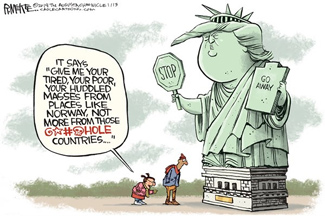 I don't use Twitter, but if I did my message would be: "I, as a grateful citizen, want our country to continue its proud tradition of welcoming the tired and poor who seek a better life. America is first in the world and thrives because of its diversity." I don't use Twitter, but if I did my message would be: "I, as a grateful citizen, want our country to continue its proud tradition of welcoming the tired and poor who seek a better life. America is first in the world and thrives because of its diversity."
Those who favor merit-based metrics argue that higher skilled, better educated immigrants are less likely to seek assistance in the form of welfare and unemployment compensation. The more meritorious the immigrant, the thinking goes, the greater his potential to earn money and pay taxes; the less the chances that he would compete with unskilled American workers for low-paying jobs.
Current law is largely based on a family-preference system, resulting in the so-called "chain migration" that Trump and his supporters oppose. In recent decades the policy has changed the ethnic composition of U.S. Immigrants—with more newcomers from Latin American and Asian countries.
Although Trump tweets about merit, what he really doesn't like is the ethnic shift, as reflected by his pompous assertion that we need more immigrants from Norway and fewer from Africa and Haiti.
Advocates of merit-based immigration, Trump among them, point to Canada and Australia, both of which use such systems. But each has struggled with formulas giving weight to education and have recently placed greater emphasis on job skills. That makes sense for two nations that are huge geographically, but relatively undersized in population.
Canada and Australia are sorely in need of filling specific, skilled jobs in science and technology—a condition that really doesn't exist in the U.S. Talented workers would undoubtedly be welcome in Silicon Valley, but what about agricultural workers in the nearby Salinas Valley? Does Trump acknowledge "merit" in farming?
The fact is unskilled, under-educated immigrants entering the U.S. catch up quickly. By the second generation they are often the very self-sufficient community contributors that Trump claims to value. They are also among the most grateful and dedicated citizens, serving in the military and in other public service jobs.
Instead of abandoning a lottery system, the U.S. should expand it. If anything, it should be weighted to favor refugees from war-torn countries and persons in need. Immigrants shouldn't be penalized for a lack of education; rather, they should be granted the chance, to the degree we can afford it, for a better life.
Isn't it remarkable how many Americans, from both sides of the political spectrum, speak about—indeed, campaign about—ancestors who came here with so little and gained so much?
The merit we focus upon should be less about the people seeking to come here, and more a measure of ourselves.
(c) Peter Funt. Distributed by Cagle syndicate.
|



 I don't use Twitter, but if I did my message would be: "I, as a grateful citizen, want our country to continue its proud tradition of welcoming the tired and poor who seek a better life. America is first in the world and thrives because of its diversity."
I don't use Twitter, but if I did my message would be: "I, as a grateful citizen, want our country to continue its proud tradition of welcoming the tired and poor who seek a better life. America is first in the world and thrives because of its diversity."